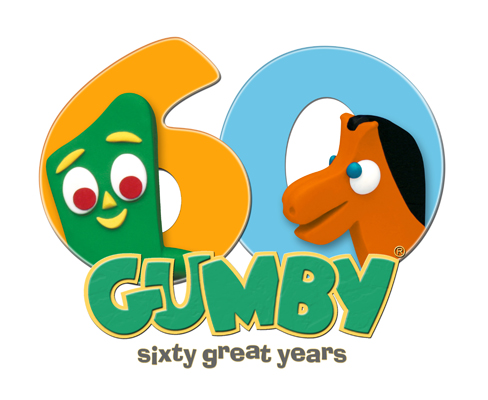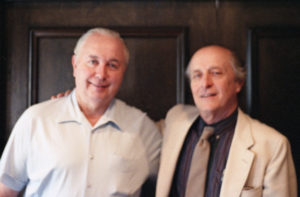Gumby Central spent some quality time with Tom Sarnoff, Gumby’s Godfather. Tom, a young executive at NBC studios in the 1950s and ‘60s, greenlit the very first Gumby Show, and he’s been involved with Gumby ever since. He has made tremendous contributions to the television industry. Here’s the interview:
GC: When did you first meet Gumby creator Art Clokey?
Tom Sarnoff (left) and Art Clokey in the ’80s
TS: I first met Art Clokey in 1955. He had been referred to me by a producer named Sam Engel. At the time I was Director of Production and Business Affairs of NBC, West Coast. Art showed me his Gumbasia film and some film of the Gumby character. I was very intrigued by what I saw, and recommended to the Program Department, headquartered in New York, that we make a deal with Art to develop the Gumby concept. Gumby was first tested on the Howdy Doody Show, and he came across as a winner. As a result, I made a deal with Art for a series.
GC: Why are you called Gumby’s Godfather?
TS: I guess… because I recommended and made the first deal for the series, and because I have been with and have been making deals for Gumby for his whole 61 years. Also, even though Gumby was the creation of Art Clokey, I have always felt something special for him and that he was “a part of me,” too.
GC: You knew Art Clokey for more than 50 years. What was Art Clokey like?
TS: Art was completely dedicated to his creations and very serious about whatever was done with Gumby. On the other hand, he fortunately also had a very good sense of humor, which he used with great success in his Gumby episodes.
I very much enjoyed working with Art. I thought that he was extremely creative, so I gave him pretty free rein in his TV series deal; and, I think it worked out well. I was also very pleased and flattered that Art came to me after we were no longer with NBC and asked me to help him get Gumby restarted. Although we tried to get a movie made, we wound up making a deal with Lorimar for a new TV series.
GC: Tom Sarnoff has worked closely with other TV, Film and Music icons.
He negotiated all of the contracts with Bob Hope for his NBC TV specials and series and all of Elvis’ NBC deals. He worked at NBC for 25 years, and in addition to his television accomplishments, he was instrumental in producing NBC’s Disney on Parade and Peter Pan arena shows. He served as an executive producer for the Bonanza TV movies and a number of Broadway productions. After founding his own company, Tom produced his own world-touring arena shows, such as Yabba Dabba Doo, featuring Hanna-Barbera characters.
Sarnoff has been a keen participant in many activities within the television Industry—he served as Chairman of the Board of Trustees of the National Academy of Television Arts & Sciences (NATAS) and was instrumental in establishing the Television Academy Foundation, among other key roles. He has also played an active leadership role in many civic and community affairs, including the Special Olympics, for which he assisted his wife Jan (President of the California chapter, 1971-85).
GC: Your father David Sarnoff is a legend in the television industry, and he’s credited with founding NBC. He’s mentioned in all the film history books. I’m sure that he influenced your choice of career. Could you speak a bit about him?
TS: My father, who was responsible for the formation of NBC, was also the visionary who envisioned television, brought it to life, and established the television industry.
During the early years of TV development, NBC experimented with showing cartoons such as Felix the Cat. In 1931 they built a studio to experiment with live broadcasting. When they were ready to expose their accomplishment, my father gathered together a group of distinguished citizens including bankers, politicians, etc. and told them what they were going to see. He pulled off a black cloth that was covering the TV monitor and said, “Ladies and Gentlemen, the first broadcast of live television.” Unbeknownst to him, however, but with the collusion of my mother, I had been sneaked over to the studio. When the black cloth was removed, out popped on the screen a little four-year old boy who waved and said, “Hello, Daddy.” I’m sure that it took a while for my father to recover from that shock when he had expected some dancing girls.
I still can feel the extreme heat of the klieg lights that they used in the studio those days, and that experience will be etched in my memory forever. Unfortunately, they did not pick up my option so I never really became a TV star.
GC: You’re a star in our book. You have an amazing list of accomplishments, too numerous to mention here. We’ve heard you say that Gumby’s strength is his character, and that “he always leaves a place better than how he found it.” You’re definitely a Gumby kindred spirit.
Thank you for joining us Tom. It has been an honor to meet with you.


